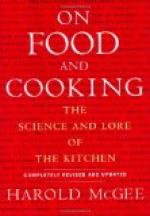CANNED PUMPKIN AND SQUASH.—These fruits when canned are quite as desirable for pies as the fresh material. The same general rules should be followed as in canning other vegetables and fruits.
TABLE TOPICS.
The word “vegetarian”
is not derived from “vegetable,” but from
the
Latin, homo vegetus,
meaning among the Romans a strong, robust,
thoroughly healthy man.
AN INTELLECTUAL FEAST.—Professor Louis Agassiz in his early manhood visited Germany to consult Oken, the transcendentalist in zooelogical classification. “After I had delivered to him my letter of introduction,” he once said to a friend, “Oken asked me to dine with him, and you may suppose with what joy I accepted the invitation. The dinner consisted only of potatoes, boiled and roasted; but it was the best dinner I ever ate; for there was Oken. Never before were such potatoes grown on this planet; for the mind of the man seemed to enter into what we ate sociably together, and I devoured his intellect while munching his potatoes.”
Dr. Abernethy’s recipe
for using cucumbers: “Peel the cucumber,
slice it, pepper it, put vinegar
to it, then throw it out the
window.”
A green son of the Emerald
Isle was eating sweet corn from the cob
for the first time. He
handed the cob to the waiter, and asked,
“Will you plaze put
some more beans on my shtick?”
A French physician styles
spinach, le balai de l’estomac (broom
of
the stomach).
An ox is satisfied with the pasture of an acre or two; one wood suffices for several elephants. Man alone supports himself by the pillage of the whole earth and sea. What? Has Nature indeed given us so insatiable a stomach, while she has given us so insignificant bodies? No; it is not the hunger of our stomachs, but insatiable covetousness which costs so much.—Seneca.
The oftener we go to the vegetable world for our food, the oftener we go to the first and therefore the cheapest source of supply. The tendencies of all advanced scholars in thrift should be to find out plans for feeding all the community, as far as possible, direct from the lap of earth; to impress science into our service so that she may prepare the choicest viands minus the necessity of making a lower animal the living laboratory for the sake of what is just a little higher than cannibal propensities.
_—Dr. B.W. Richardson._
A VOICE FROM THE CORN.
I was made to be eaten,
not to be drank,
To be husked in a barn,
not soaked in a tank;
I come as a blessing
when put in a mill,
As a blight and a curse
when run through a still.
Make me up into loaves,
and your children are fed;
But made into drink,
I will starve them instead.
In bread I’m a
servant the eater shall rule,
In drink I’m a
master, the drinker a fool.
Then remember my warning;
my strength I’ll employ,
If eaten, to strengthen,
if drunk, to destroy.




